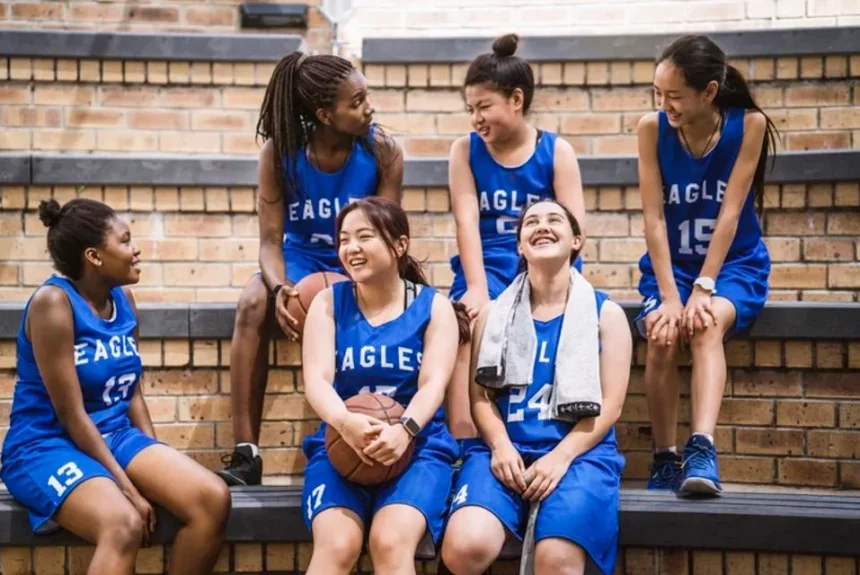Part of Kathy Caprino’s series “Women, Leadership and Vision”
Amid record-breaking attendance and viewership of women’s sports, a new survey released in August 2023 from Deloitte found that playing competitive sports often sets women up to build successful careers. The report titled “Impact of Sports on Women’s Professional Success,” revealed that women who played competitive sports in their youth are more likely to be in leadership or management roles.
The online survey of 1,100 currently and previously employed Americans, age 18+, was conducted in August 2023. As a competitive tennis player in my youth, I’ve experienced firsthand how engaging in competitive sports builds skills and abilities that are instrumental in professional life and in leadership and managerial roles, as well as in our success in supporting employees and teams to thrive. From resilience to problem-solving, to leadership and communication strength and more, the skills we learn playing sports can be greatly beneficial to our career growth and success.
Key findings of the survey include:
- 85% of women surveyed who played sports shared that the skills they developed playing sports were important to success in their professional careers — the findings are even higher among women in leadership roles (91%) and women who make $100,000 or more (93%).
- Of female respondents who earn $100K+ annually and are in management or leadership roles, 69% have played competitive sports.
- Regardless of personal experience playing sports, 61% of respondents agree that girls who play sports are likely to have successful careers.
- 75% of women surveyed who played competitive sports agree that girls who play competitive sports are more likely to be successful in their careers.
- According to respondents who have played competitive sports, the top skills gained from competitive sports include teamwork (69%) and leadership (41%). Other skills include managing stress and pressure (36%), problem-solving (35%), and effective communication (34%).To learn more about Deloitte’s study and implications, I caught up with Lara Abrash, Chair of Deloitte US, the largest professional services organization in the United States with more than 170,000 professionals. Abrash rose to the position of Chair in June 2023 after serving four years as the Chair and Chief Executive Officer of Deloitte & Touche LLP, where she was responsible for overseeing the US Audit & Assurance business. She is also a member of Deloitte Global’s Board of Directors and Chair of the Deloitte Foundation.
Here’s what Abrash shares about the study and supporting women’s professional growth:
Kathy Caprino: Lara, can you provide an overview of the “Impact of Sports on Women’s Professional Success” survey Deloitte recently conducted and share a bit about why Deloitte conducted this research at this time?
Lara Abrash: We took the pulse of the market through this survey because we noticed a common trend among the top female executives in our organization and our clients: we played sports. We believe the skills gained through competitive sports lay the foundation for successful business leaders, and this survey provided us with key insights into the effects sports can have on the broader business world.
Deloitte examines the role that competitive athletics play in shaping women’s career success through teamwork, persistence and resolve, effective communication, problem-solving, and more. We found that the majority of women respondents (85%) agreed that sports played an important role in their careers. This notion became increasingly apparent for women in leadership roles, with a vast majority (91%) attributing skills developed through sports as critical to their overall success in the workplace.
Caprino: So how are you seeing from the research that playing competitive sports can help women overcome the challenges they may face in the workplace?
Abrash: Many of the skills we gain by playing sports can translate directly to a business environment. Skills such as teamwork, communication, problem-solving, and handling stressful situations are all deeply ingrained in athletes. Being in a competitive business environment can often feel like an intense basketball game or soccer match with your fiercest rival. Having the experience of applying these skills in high-pressure environments and working through adversity in a competitive situation at a young age can prepare young women in the long term for any curveballs their professional careers may throw.
Caprino: In Deloitte’s survey, teamwork was selected as the top skill learned from sports that translates to career success. As a competitive tennis player in my teen years, I’ve seen firsthand that this is a skill that we definitely learn from sports, along with goal setting, self-mastery, feedback, and communication, thinking on our feet, building trust and support, resilience after failure, trusting our instincts, and more. In fact, in my recent interview with Manuela Nicolosi – one of the top female soccer referees in the world – she shared there are many leadership skills we learn in sports. As an avid sportsperson yourself – managing and playing first base on a competitive women’s softball team – what have you learned from sports that has contributed to your career success?
Abrash: Well, firstly, I couldn’t agree more; there are many leadership skills we learn in sports. I grew up with older brothers and sports was part of my daily life and it has been the cornerstone of my career in the corporate world. Many of the lessons I gained on the field are still with me today as Chair of Deloitte US.
A critical leadership lesson I learned in sports is that you don’t have to be the best player on the field to become a leader. In sports and in business, I think that a lot of leaders feel they need to prove they are always the best, smartest, or fastest person in the room.
But that is not our role as a leader. Our role is assembling the right team, developing a vision and strategy, aligning and empowering team members to achieve our shared commitment, providing the coaching and tools they need to succeed, and ultimately executing together to reach our goal.
Leadership is about inspiring, uplifting, and empowering those around you to achieve their own “wins.” No matter how small or large a team you are working with, a leader finds ways to identify individual strengths, creates an environment where everybody fits together, and is working toward a common goal. In this way, the lessons I have learned about teamwork are paramount to my role as a leader at Deloitte.
Caprino: What do you think this data means for young women today, and how can participating in a sport set them up for success in the workplace?
Abrash: For many young women, sports can provide the confidence to be heard, seen, and respected as a player in many male-dominated professional spaces. Sport is truly the great equalizer.
I hope that the report inspires girls and young women who are interested in sports to get involved and give it everything they have. Regardless of how far one goes in their sports career, there are critical lessons and skills that help them grow as individuals and set themselves up for success in the future, both in professional careers and, more generally, serve as life lessons.
If young women—and parents—can take one thing away from this data it is that getting involved in competitive sports and learning to deal with those high-pressure situations at a young age is extremely beneficial to career growth and as members of society.
Caprino: What are some of the best ways for employers to support professional women to grow and thrive in the workplace?
Abrash: Although this particular survey didn’t look into that question, Deloitte’s Women @ Work global survey (now in its third year) did provide some insights, and the topic is certainly top-of-mind. Although we are making progress toward lower burnout and stress levels, mental health is still a concern—and many women are struggling to “switch off” from work. That report found that fewer women say they get adequate mental health support from their employers, and, not surprisingly, elements outside of the workplace also take a toll as most respondents (88%) bear the greatest responsibility for household tasks and often feel they need to prioritize their partners’ careers over their own.
We should be challenging ourselves and our organizations to rethink and reimagine the way we work to best support the needs of our people. There is a narrative of “doing it all” that many women feel pressure to uphold, and they can be reluctant to ask for help due to a societally-instilled fear of being seen as incompetent, incapable, or underqualified.
Creating an inclusive environment that encourages women to be their authentic selves and celebrates their superpowers—instead of putting the onus on them to assimilate into an organization’s (likely outdated) culture—is paramount to supporting their growth. By being intentional about recognizing, empathizing with, and supporting the whole employee—not just who they are through a screen or within the four walls of an office—we can better balance flexibility and predictability, provide opportunities for skill development, meaningfully connect with one another, and empower our people to show up and thrive as themselves.
Caprino: How are you using your role as Chair to advance inclusivity and efforts to give more women a seat at the table?
Abrash: We know that female and minority representation among corporate (especially Fortune 500) boards has significant room for improvement until we reach parity. Increasing diversity and inclusion in the boardroom is one of my top priorities as Chair, because through governance and advocacy we can effect real change that benefits our organization, clients, and communities.
Women who hold roles on boards, in the C-suite, or at top levels of leadership tend to pave the way, create new roles, or serve as mentors for other women within their organizations—causing a profound ripple effect. As someone with a seat at the table, I believe it is my responsibility to serve as an advocate for those who don’t by championing their views and elevating their voices.
And there are so many influential female voices that need to be heard, which is why we are developing programs to gather cohorts of female board chairs and committee members to share their unique perspectives, lessons learned, and advocate for themselves and others. You can’t be what you can’t see, so for me personally, that means mentoring women and sharing my stories with our up-and-coming women.
An inclusive boardroom is, in many ways, the foundation for an inclusive organization. I’m passionate about seeking out, challenging, and highlighting opportunities to improve our approach to DEI and ensure we are making meaningful progress against the goals outlined in our annual DEI Transparency Report at every level of our organization. This includes fostering an environment in our boardroom that encourages the hard truths and open and transparent dialogue.
It often also involves looking critically at data (including retention, performance management, advancement, succession, and representation) to assess not only if we’re moving in the right direction, but also how we’re executing on our plans and whether they’re sustainable.
Being strategic, just, and steadfast in our approach to creating generational opportunities and progress for women will demonstrate that there are plenty of seats at the table, and that those seats are theirs for the taking.
For more information, visit Deloitte on sponsoring professional women’s growth.
Kathy Caprino is a women’s career and leadership coach, trainer, Finding Brave podcast host, and author of The Most Powerful You.





